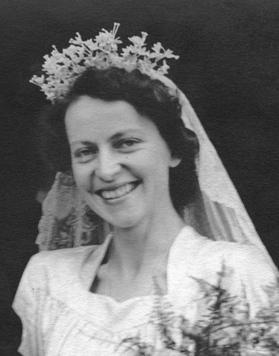Máire MacSwiney Brugha facts for kids
Quick facts for kids
Máire MacSwiney Brugha
|
|
|---|---|
 |
|
| Born |
Máire MacSwiney
23 June 1918 Cork, Ireland
|
| Died | 20 May 2012 (aged 93) Dublin, Ireland
|
| Nationality | Irish |
|
Notable work
|
History's Daughter: A Memoir from the Only Child of Terence MacSwiney |
| Spouse(s) | Ruairí Brugha |
| Children | 4; including Cathal MacSwiney Brugha |
| Parents |
|
Máire MacSwiney Brugha (born June 23, 1918 – died May 20, 2012) was an important Irish activist and author. She was the daughter of Terence MacSwiney, a famous leader in Cork. Her aunt was Mary MacSwiney. Máire is remembered for her own contributions to Irish history.
Early Life
Máire was born on June 23, 1918, in Cork, Ireland. Her father, Terence MacSwiney, was the Lord Mayor of Cork. He was in prison when she was born and didn't meet her until she was three months old. Sadly, her father died when she was only two years old. He passed away after going on a hunger strike in prison. This was a protest for Irish independence. This event deeply affected her family and her life.
After her father's death, Máire's mother moved to Dublin. Máire sometimes lived with Nancy O'Rahilly, the wife of another Irish leader. Her parents had wanted her to speak Irish. However, because of her father's death and her mother's health, Máire moved to Germany in 1923. She moved around a lot there. She learned German and spoke little English or Irish.
In 1930, Máire moved to Grainau, in Bavaria, Germany. She went to school there. Her aunt, Mary MacSwiney, was one of her legal guardians. Her aunt eventually brought her back to Ireland. This caused a court case, as some claimed her aunt had kidnapped her. The court decided that her aunt would have custody. As a result, Máire and her mother became estranged.
Education and Teaching Career
Máire attended Scoil Íte and then St. Louis convent in Monaghan. In 1936, she finished her Leaving Certificate. This is a big exam in Ireland. She then won a scholarship to University College Cork to study arts.
In 1937, Máire played the main role in a play called The Revolutionist. Her father had written this play in 1914. Her aunt produced it. Máire returned to Germany in 1938 to practice her German. She graduated from university with a first-class honours degree. She then earned her Higher Diploma and became a teacher. She taught for a while at Scoil Íte. In 1942, she moved to Dublin to get a master's degree.
Family and Political Life
While in Dublin, Máire met Ruairí Brugha. His father, Cathal Brugha, was killed in the Irish Civil War in 1922. Máire and Ruairí married on July 10, 1945. They had four children: Deirdre, Cathal, Traolach, and Ruairí.
Máire strongly supported her husband's political career. He became a senator, a TD (a member of the Irish parliament), and a member of the European Parliament. Máire herself led her local Fianna Fáil group, called a cumann. She also volunteered with Gorta, an aid agency.
From 1975 to 1977, her husband was the main opposition spokesperson for Northern Ireland. Máire and Ruairí worked together on new policies. They focused on bringing people together. This was different from earlier policies that aimed more at ending the division of Ireland.
Author and Legacy
When Máire was 85 years old, her eyesight began to fail. She then dictated her life story to her daughter-in-law, Catherine Brugha. This book, called History's Daughter: A Memoir from the Only Child of Terence MacSwiney, was published in 2005. Her story was also recorded in Irish Life and Lore and made into a radio show.
Many people recognized Máire's importance. Micheál Martin, the leader of Fianna Fáil, said she made a "strong and valued" contribution to the party. Gerry Adams said she "made her mark" on Irish history.
 | James B. Knighten |
 | Azellia White |
 | Willa Brown |

